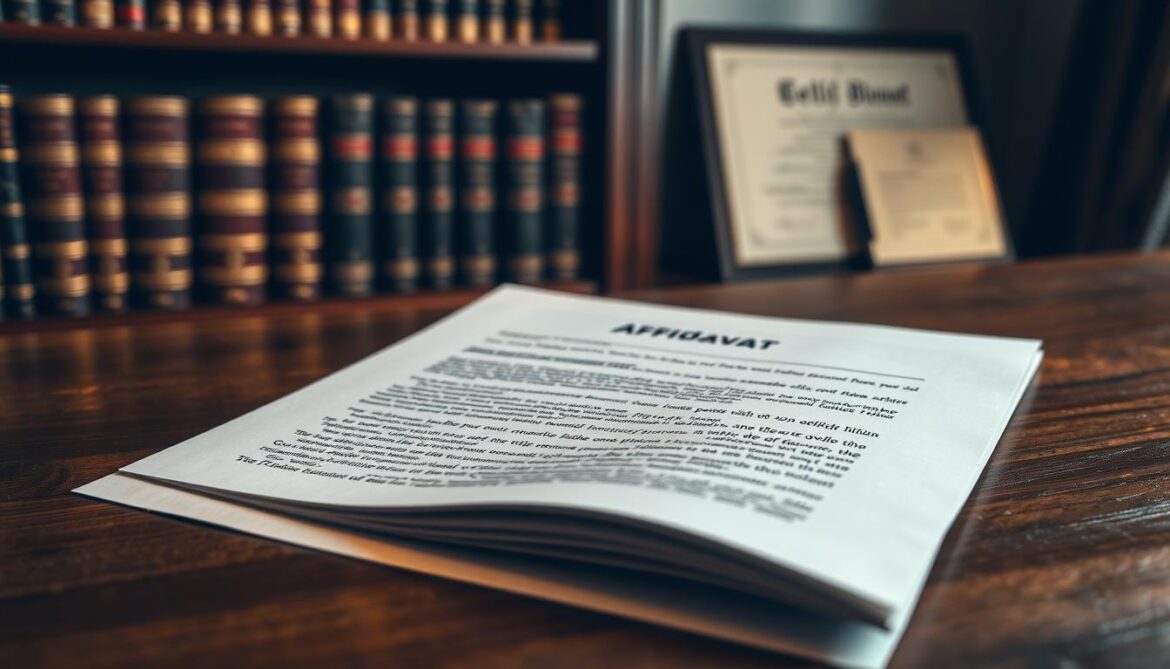तुम्ही दिवाणी खटला, मालमत्तेचा वाद किंवा कोणत्याही कायदेशीर प्रकरणात सामील असाल, तर न्यायालयांच्या आणि शपथपत्रांसारख्या मूलभूत घटकांना समजून घेणे महत्त्वाचे आहे. हे सर्वसमावेशक मार्गदर्शक तुम्हाला न्यायालयीन प्रक्रिया आत्मविश्वासाने हाताळण्यास मदत करण्यासाठी, न्यायालय आणि शपथपत्रे (affidavits) याबद्दलची सर्व आवश्यक माहिती स्पष्ट आणि सरळ भाषेत सादर करते.
न्यायालयीन प्रणाली समजून घेणे
न्यायालये ही कायद्यानुसार कायदेशीर वाद सोडवण्यासाठी स्थापन केलेली सरकारी संस्था आहेत. ती आपल्या न्यायव्यवस्थेचा कणा आहेत, जिथे न्यायाधीश किंवा मॅजिस्ट्रेटसारख्या पात्र अधिकाऱ्यांद्वारे कायदेशीर बाबी ऐकल्या जातात आणि त्यावर निर्णय घेतले जातात. न्यायालये विशिष्ट प्रकरणांमध्ये कायद्याचा अर्थ लावतात आणि तो लागू करतात, तसेच न्याय निष्पक्षपणे आणि निःपक्षपातीपणे दिला जातो याची खात्री करतात.
न्यायालयांचे प्रकार आणि त्यांचे अधिकारक्षेत्र
- दिवाणी न्यायालये (Civil Courts) दिवाणी न्यायालये व्यक्ती, संस्था किंवा घटकांमधील वाद हाताळतात. या प्रकरणांमध्ये सामान्यतः करार (contract) संबंधी वाद, मालमत्तेचे मुद्दे, कौटुंबिक बाबी आणि वैयक्तिक दुखापतीचे दावे यांचा समावेश होतो. याचा मुख्य उद्देश दायित्व निश्चित करणे आणि योग्य उपाययोजना प्रदान करणे आहे, ज्यात आर्थिक भरपाई किंवा विशिष्ट कर्तव्यांची पूर्तता यांचा समावेश असू शकतो.
- फौजदारी न्यायालये (Criminal Courts) फौजदारी न्यायालये राज्य किंवा लोकांविरुद्ध केलेल्या गुन्ह्यांचा आरोप असलेल्या व्यक्तींची प्रकरणे हाताळतात. ही न्यायालये आरोपी दोषी आहे की नाही हे ठरवतात आणि दोषी आढळलेल्यांवर योग्य शिक्षा लादतात. फौजदारी कार्यवाहीमध्ये सरकारचे प्रतिनिधित्व करणारे सरकारी वकील (prosecutors) आणि आरोपीचे प्रतिनिधित्व करणारे बचाव वकील (defense attorneys) असतात.
- कौटुंबिक न्यायालये (Family Courts) कौटुंबिक न्यायालये घटस्फोट, मुलांचा ताबा, दत्तक आणि घरगुती हिंसाचारासारख्या कौटुंबिक संबंधांशी संबंधित प्रकरणांमध्ये विशेष काम करतात. ही न्यायालये मुलांच्या सर्वोत्तम हिताचे रक्षण करणे आणि संबंधित भावनिक बाबी संवेदनशीलतेने हाताळून कौटुंबिक वाद सोडवण्याचे ध्येय ठेवतात.
- प्रोबेट न्यायालये (Probate Courts) प्रोबेट न्यायालये मृत्यूपत्र (wills), इस्टेट (estates) आणि असमर्थतेमुळे स्वतःची काळजी घेऊ शकत नसलेल्या लोकांच्या प्रकरणांशी संबंधित बाबी हाताळतात. ती मृत्यूनंतर मालमत्तेच्या वितरणावर आणि अल्पवयीन किंवा असमर्थ प्रौढांसाठी पालक नेमण्यावर देखरेख करतात.
न्यायालयांची पदानुक्रम आणि अपील प्रक्रिया
बहुतेक कायदेशीर प्रणालींमध्ये न्यायालयांची पदानुक्रमित रचना असते, ज्यात कनिष्ठ न्यायालये सुरुवातीची प्रकरणे हाताळतात आणि उच्च न्यायालये अपीलावर (appeal) निर्णयांचे पुनरावलोकन करतात. या संरचनेत सामान्यतः ट्रायल कोर्ट (trial courts), अपील न्यायालये (appellate courts) आणि सर्वोच्च स्तरावर सर्वोच्च न्यायालय (supreme court) यांचा समावेश होतो. ही पदानुक्रम समजून घेणे महत्त्वाचे आहे, कारण ते तुमचे प्रकरण कुठे ऐकले जाईल आणि न्यायालयाच्या निर्णयाशी तुम्ही असहमत असल्यास तुमच्याकडे कोणते पर्याय आहेत, हे ठरवते.
शपथपत्र (Affidavit) म्हणजे काय?
शपथपत्र म्हणजे तथ्यांचे एक लिखित विधान, जे ते तयार करणाऱ्या व्यक्तीने (deponent or affiant) नोटरी पब्लिक किंवा न्यायालयाच्या अधिकाऱ्यासारख्या अधिकृत व्यक्तीसमोर सत्य असल्याचे शपथपूर्वक सांगितले आहे. शपथपत्रावर स्वाक्षरी करून, तुम्ही कायदेशीररित्या घोषित करता की त्यात असलेली माहिती तुमच्या माहितीनुसार सत्य आणि अचूक आहे.
जेव्हा प्रत्यक्ष साक्ष देणे शक्य नसते किंवा आवश्यक नसते, तेव्हा शपथपत्रे कायदेशीर कार्यवाहीमध्ये पुरावा म्हणून काम करतात. न्यायालयामध्ये शपथ घेऊन दिलेल्या साक्षीप्रमाणेच त्यांना कायदेशीर वजन असते आणि शपथपत्रात खोटी विधाने केल्यास खोट्या साक्षीसाठी (perjury) दंड होऊ शकतो.
वैध शपथपत्राचे महत्त्वाचे घटक
कायदेशीररित्या वैध असण्यासाठी, शपथपत्रात अनेक आवश्यक घटक असणे आवश्यक आहे:
शपथपत्राचे आवश्यक घटक
- शीर्षक आणि कॅप्शन (Title and Caption): न्यायालयाचे आणि प्रकरणातील पक्षांचे नाव.
- प्रारंभ (Commencement): शपथ देणाऱ्या व्यक्तीचे नाव, पत्ता आणि व्यवसाय.
- मुख्य भाग (Body): शपथ देणाऱ्या व्यक्तीला ज्ञात असलेल्या तथ्यात्मक विधानांसह क्रमांकित परिच्छेद.
- सत्यतेचे विधान (Statement of Truth): शपथ देणाऱ्याच्या माहितीनुसार सामग्री सत्य असल्याचे पुष्टीकरण.
- स्वाक्षरी (Signature): अधिकृत व्यक्तीच्या उपस्थितीत शपथ देणाऱ्याने स्वाक्षरी करणे आवश्यक.
- जुराट (Jurat): अधिकृत व्यक्तीने शपथपत्र कधी, कुठे आणि कोणासमोर शपथपूर्वक दिले, हे प्रमाणित करणारा विभाग.
- एक्झिबिट्स (Exhibits): शपथपत्रात उल्लेख असलेली कोणतीही सहायक कागदपत्रे, योग्यरित्या लेबल केलेली आणि जोडलेली.
शपथपत्रांचे प्रकार आणि त्यांचे उपयोग
शपथपत्रांचे प्रकार त्यांच्या उद्देशानुसार आणि त्यातील माहितीनुसार भिन्न असतात:
- निवासाचे शपथपत्र (Affidavit of Residence): एखाद्या व्यक्तीचा सध्याचा पत्ता प्रमाणित करतो आणि सामान्यतः शाळेत प्रवेश, मतदान नोंदणी किंवा करासाठी निवासस्थान स्थापित करण्यासाठी वापरला जातो.
- आर्थिक शपथपत्र (Financial Affidavit): एखाद्या व्यक्तीच्या आर्थिक स्थितीचा तपशील देतो, ज्यात उत्पन्न, खर्च, मालमत्ता आणि दायित्वे (liabilities) यांचा समावेश होतो. घटस्फोटाच्या प्रकरणांमध्ये, दिवाळखोरीच्या प्रकरणांमध्ये किंवा आर्थिक मदतीसाठी अर्ज करताना याची अनेकदा आवश्यकता असते.
- वारसा हक्काचे शपथपत्र (Affidavit of Heirship): जेव्हा औपचारिक मृत्यूपत्र नसते, तेव्हा एखाद्या व्यक्तीचा मालमत्ता वारसा हक्काने मिळवण्याचा अधिकार स्थापित करतो, ज्यामुळे प्रोबेट (probate) प्रक्रियेशिवाय मालमत्तेचे हस्तांतरण होते.
- ओळखीचे शपथपत्र (Affidavit of Identity): एखाद्या व्यक्तीची ओळख सत्यापित करतो, अनेकदा ओळख चोरीच्या बाबतीत किंवा हरवलेली ओळखपत्रे बदलताना वापरला जातो.
- समर्थनाचे शपथपत्र (Affidavit of Support): एखाद्या व्यक्तीला आर्थिक मदत करण्याची क्षमता दर्शवतो, सामान्यतः स्थलांतरणाच्या प्रकरणांमध्ये किंवा मुलांच्या पालनपोषण खर्चाच्या बाबींमध्ये वापरला जातो.
- सेवेचे शपथपत्र (Affidavit of Service): कायदेशीर कागदपत्रे इच्छित प्राप्तकर्त्याकडे योग्यरित्या पोहोचली असल्याची पुष्टी करतो, ज्यामुळे कायदेशीर कार्यवाहीमध्ये योग्य प्रक्रिया सुनिश्चित होते.
वैध शपथपत्र कसे तयार करावे
कायदेशीररित्या वैध शपथपत्र तयार करण्यासाठी तपशीलांकडे लक्ष देणे आणि विशिष्ट स्वरूपण आणि कार्यपद्धती आवश्यकतांचे पालन करणे आवश्यक आहे. तुमचे शपथपत्र न्यायालयांनी स्वीकारले जाईल आणि त्याच्या उद्देशाची पूर्तता करेल याची खात्री करण्यासाठी या पायऱ्यांचे अनुसरण करा.
शपथपत्र तयार करण्यासाठी मार्गदर्शक
- उद्देश आणि आवश्यकता निश्चित करा: तुम्हाला शपथपत्राची गरज का आहे आणि त्यात कोणती विशिष्ट माहिती असावी हे ओळखा. न्यायालय किंवा एजन्सीच्या विशिष्ट स्वरूपण आवश्यकता आहेत का ते तपासा.
- आवश्यक माहिती गोळा करा: तुमच्या शपथपत्रात उल्लेख केलेल्या सर्व संबंधित तथ्ये, तारखा, नावे आणि सहायक कागदपत्रे गोळा करा.
- कागदपत्र योग्यरित्या स्वरूपित करा: शपथपत्र म्हणून त्याची ओळख करून देणारे शीर्षक आणि लागू असल्यास प्रकरणाचे नाव आणि क्रमांक समाविष्ट करून सुरुवात करा. न्यायालयाच्या माहितीसह एक कॅप्शन (caption) समाविष्ट करा.
- प्रारंभ लिहा: तुमचे पूर्ण कायदेशीर नाव, पत्ता, व्यवसाय आणि तुम्ही कायदेशीर वयाचे आणि साक्ष देण्यासाठी सक्षम आहात असे विधान करून परिच्छेदाने सुरुवात करा.
- मुख्य भाग तयार करा: तथ्ये क्रमांकित परिच्छेदांमध्ये सादर करा, प्रत्येक परिच्छेदामध्ये एकच तथ्य किंवा जवळच्या संबंधित तथ्ये असावीत. स्पष्ट, संक्षिप्त भाषेचा वापर करा आणि स्पष्टपणे नमूद केल्याशिवाय मते टाळा.
- सत्यतेचे विधान समाविष्ट करा: तुमच्या माहितीनुसार सामग्री सत्य आणि योग्य आहे असे पुष्टीकरण करून मुख्य भाग समाप्त करा.
- स्वाक्षरीसाठी तयारी करा: तुमच्या स्वाक्षरीसाठी, तारखेसाठी आणि जुराटसाठी (नोटरीचे प्रमाणपत्र) जागा सोडा.
- एक्झिबिट्स जोडा: तुमच्या शपथपत्रात कागदपत्रांचा संदर्भ असल्यास, त्यांना एक्झिबिट्स म्हणून जोडा आणि योग्यरित्या लेबल करा (उदा. “एक्झिबिट अ,” “एक्झिबिट ब”).
नोटरायझेशन आणि साक्षीदाराच्या आवश्यकता
शपथपत्र एका अधिकृत व्यक्तीच्या उपस्थितीत स्वाक्षरी करणे आवश्यक आहे, जी शपथ देऊ शकते. ही व्यक्ती सामान्यतः नोटरी पब्लिक असते, परंतु तुमच्या अधिकारक्षेत्रानुसार त्यात न्यायालयाचे लिपिक, न्यायाधीश किंवा वकील देखील असू शकतात. अधिकृत व्यक्ती:
- सरकारी ओळखपत्राचा वापर करून तुमची ओळख सत्यापित करेल.
- तुम्ही शपथपत्रातील सामग्री सत्य असल्याचे शपथ किंवा प्रतिज्ञा घेणार.
- तुम्ही कागदपत्रावर स्वाक्षरी करत असताना साक्ष देईल.
- त्यांच्या स्वाक्षरी, शिक्का किंवा मुद्रा आणि तारखेसह जुराट विभाग पूर्ण करेल.
टाळण्यासाठी सामान्य चुका
या सामान्य चुका टाळा
- मते स्पष्टपणे न सांगता केवळ तथ्ये म्हणून त्यांचा समावेश करणे.
- अनेक प्रकारे अर्थ काढता येईल अशी अस्पष्ट भाषा वापरणे.
- हेअरसे (Hearsay) (तुम्ही दुसऱ्याकडून ऐकलेली माहिती) स्त्रोत स्पष्ट न करता समाविष्ट करणे.
- सादर करण्यापूर्वी शपथपत्राचे योग्य नोटरायझेशन न करणे.
- प्रकरणासाठी संबंधित असलेली महत्त्वाची माहिती वगळणे.
- गैर-संबंधित माहिती समाविष्ट करणे ज्यामुळे दस्तऐवज गोंधळात पाडतो.
- परिच्छेदांना क्रमांक न देणे किंवा माहिती योग्यरित्या मांडणी न करणे.
- नोटरी किंवा अधिकृत व्यक्तीसमोर हजर होण्यापूर्वीच शपथपत्रावर स्वाक्षरी करणे.
न्यायालयात शपथपत्र सादर करणे
एकदा तुमचे शपथपत्र योग्यरित्या तयार आणि नोटरीकृत झाल्यावर, तुम्हाला ते योग्य न्यायालयात सादर करावे लागेल. सादर करण्याची प्रक्रिया न्यायालय आणि प्रकरणाच्या प्रकारानुसार बदलते, परंतु सामान्यतः या पायऱ्यांचे अनुसरण करते:
फाइलिंग प्रक्रिया आणि आवश्यकता
- योग्य न्यायालय निश्चित करा: तुमचे प्रकरण ज्या न्यायालयाच्या अधिकारक्षेत्रात येते, त्याच न्यायालयात तुम्ही फाइलिंग करत असल्याची खात्री करा.
- स्थानिक नियम तपासा: शपथपत्रांशी संबंधित कोणत्याही विशिष्ट आवश्यकतांसाठी न्यायालयाचे स्थानिक नियम तपासा.
- प्रती तयार करा: मूळ शपथपत्र, प्रकरणातील प्रत्येक पक्षासाठी प्रती आणि तुमच्या नोंदींसाठी एक प्रत तयार करा.
- कव्हर शीट पूर्ण करा: अनेक न्यायालयांना तुमच्या शपथपत्रासोबत कव्हर शीट किंवा फाइलिंग फॉर्मची आवश्यकता असते.
- फाइलिंग शुल्क भरा: आवश्यक फाइलिंग शुल्क भरण्यासाठी तयार रहा, जे न्यायालय आणि प्रकरणाच्या प्रकारानुसार बदलते.
- लिपिकाकडे सादर करा: कागदपत्रे न्यायालयाच्या लिपिकाच्या कार्यालयात फाइलिंगसाठी घेऊन जा.
- इतर पक्षांना सेवा द्या: शपथपत्राच्या प्रती प्रकरणातील इतर सर्व पक्षांना योग्यरित्या मिळाल्या आहेत याची खात्री करा.
- फाइलिंगचा पुरावा ठेवा: शपथपत्र योग्यरित्या सादर झाले आहे याचा पुरावा म्हणून तुमची फाइल-स्टॅम्प केलेली प्रत ठेवा.
वेळ आणि अंतिम मुदती
न्यायालयांमध्ये शपथपत्रे दाखल करण्यासाठी कठोर अंतिम मुदती असतात, ज्या प्रकरणाच्या प्रकारानुसार आणि स्थानिक नियमांनुसार बदलतात. या अंतिम मुदती चुकल्यास तुमचे शपथपत्र नाकारले जाऊ शकते किंवा न्यायालयाद्वारे विचारात घेतले जाऊ शकत नाही.
शपथपत्र विरुद्ध इतर कायदेशीर कागदपत्रे
शपथपत्रे इतर कायदेशीर कागदपत्रांपेक्षा कशी वेगळी आहेत हे समजून घेतल्यास तुम्हाला तुमच्या परिस्थितीसाठी योग्य ते निवडण्यास मदत होईल.
खोट्या विधानांचे परिणाम
शपथपत्रात खोटी विधाने करणे हा एक गंभीर गुन्हा आहे, ज्यामुळे गंभीर कायदेशीर परिणाम होऊ शकतात. शपथपत्र शपथपूर्वक दिले जात असल्यामुळे, खोटी विधाने करणे ही बहुतेक अधिकारक्षेत्रांमध्ये एक फौजदारी गुन्हा आहे.
खोट्या साक्षीसाठी संभाव्य दंड
- आर्थिक दंड आणि/किंवा तुरुंगवासासह फौजदारी आरोप.
- सध्याच्या आणि भविष्यातील कायदेशीर कार्यवाहीमध्ये तुमच्या विश्वासार्हतेचे नुकसान.
- परवाने किंवा प्रमाणपत्रे गमावण्यासह व्यावसायिक परिणाम.
- खोट्या विधानांमुळे झालेल्या नुकसानीसाठी दिवाणी दायित्व.
- तुमचे प्रकरण किंवा दावे खोट्या शपथपत्रांवर आधारित असल्यास ते फेटाळले जाणे.
निष्कर्ष
न्यायालयीन प्रणाली हाताळणे आव्हानात्मक असू शकते, परंतु न्यायालय आणि शपथपत्रांचे मूलभूत ज्ञान तुम्हाला कायदेशीर कार्यवाहीमध्ये प्रभावीपणे सहभागी होण्यास सक्षम करते. शपथपत्रे तुमच्या वैयक्तिक ज्ञानाला औपचारिक न्यायालयीन प्रक्रियेशी जोडणारा एक महत्त्वाचा दुवा म्हणून काम करतात, ज्यामुळे तुम्हाला तथ्ये एका संरचित, कायदेशीररित्या मान्यताप्राप्त स्वरूपात सादर करता येतात.
लक्षात ठेवा की शपथपत्रांना प्रत्यक्ष शपथ घेऊन दिलेल्या साक्षीप्रमाणेच वजन असते. ही शक्ती जबाबदारीसह येते – तुमचे शपथपत्र सत्य, अचूक आणि योग्यरित्या अंमलात आणलेले आहे याची खात्री करणे केवळ कायदेशीर अनुपालनाबद्दल नाही, तर आपल्या न्यायव्यवस्थेची अखंडता राखण्याबद्दल आहे.
तुम्ही कौटुंबिक बाबी, मालमत्तेचा वाद किंवा इतर कोणत्याही कायदेशीर प्रक्रियेत सामील असाल, तर शपथपत्रे योग्यरित्या कशी तयार करावी, सादर करावी आणि वापरावी हे समजून घेण्यासाठी वेळ काढल्यास तुमच्या प्रकरणाच्या निकालावर लक्षणीय परिणाम होऊ शकतो. शंका असल्यास, कायदेशीर व्यावसायिकांकडून मार्गदर्शन घेणे तुम्हाला या महत्त्वाच्या कागदपत्रांना आत्मविश्वासाने हाताळण्यास मदत करू शकते.

